FedEx is warning customers to remain vigilant of email scams after one holiday-season-related scam was reported by customers.

The message, with the subject line “FedEx: Delivery Problems Notification,” falsely tells consumers that their holiday packages weren’t sent. FedEx shared a sample screenshot of such an email on its website.
WATCH: Phony invoices used to scam online shoppers

It reads: “Not possible to make delivery. Our companys courier couldn’t make the delivery.”
The email then prompts shoppers to click a “Delivery Manager” link, which asks for them to review and submit an invoice. The company warns that the link contains a virus.

Get breaking National news
What are the warning signs?
On its website, FedEx Canada explains that the company never sends “unsolicited emails” which ask for information about invoices, account numbers, credit cards, or other personal details.
“If you receive this type of email claiming to be from FedEx, never provide any personal information or click on any links or attachments,” it warns.
READ MORE: A fake Netflix email wants users’ billing information — don’t click it
The company also explains that phishing scams will use a fake logo, corporate colours and business names to make the emails appear real.
But there are ways to tell if an email is fake. For example, there may be grammar or punctuation errors, requests for an urgent response, warnings of penalties such as account deactivation, and incorrect addresses.
FedEx asks customers who receive suspicious emails to forward them to abuse@fedex.com, then immediately delete it.
WATCH: Tax scammers push refunds to steal personal information

More risk of scams during the holidays?
This isn’t the first holiday scam reported online this year. Last week, warnings emerged over a Secret Santa knock-off making the rounds on Facebook.
READ MORE: ‘Secret sister’ gift exchange on Facebook likely to leave you empty handed
The Better Business Bureau (BBB) also cautioned the public about fake email invoices over the holidays, adding that the scams are becoming more sophisticated.
Evan Kelly, the BBB’s spokesman, told Global News that consumers who click on these emails are opening themselves to several risks.
WATCH: Better Business Bureau urges managers to talk to staff about scams

“If you click on one of these links, you could be opening up yourself to malware that could freeze your computer,” Kelly said. “Sometimes they could be phishing for your social insurance number because if someone has your social insurance number, they can start accessing government programs and opening bank accounts in your name.”
READ MORE: Shoppers, think twice before you click an invoice like this during the holiday season
But James Anderson, a spokesperson for FedEx Express Canada, told Global News that consumers should be vigilant of phishing scams throughout the year — not just the holidays.





Comments